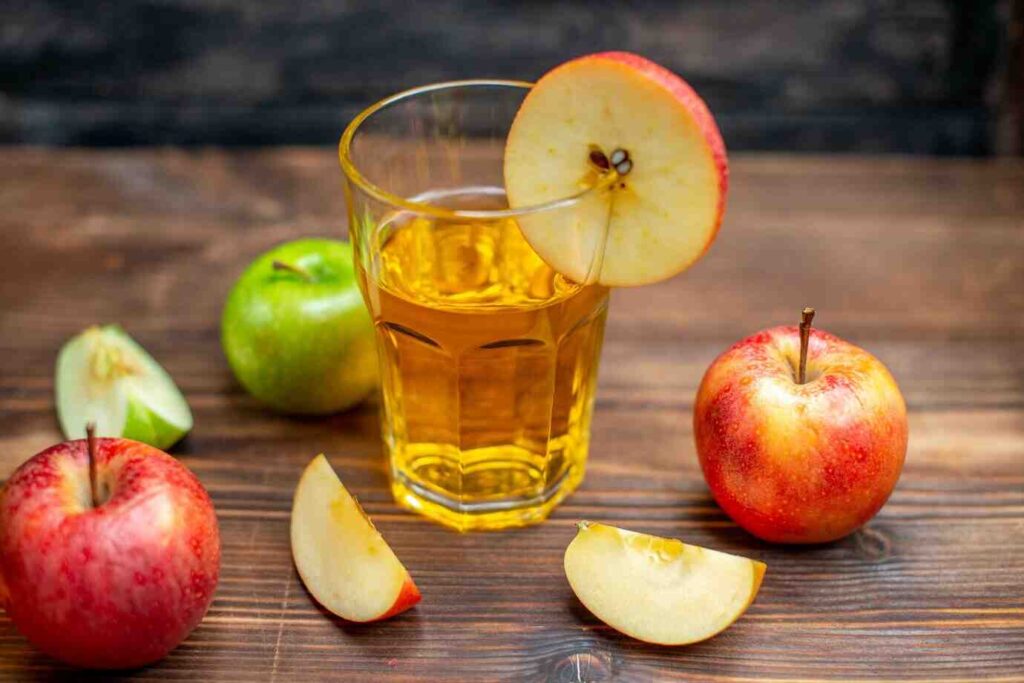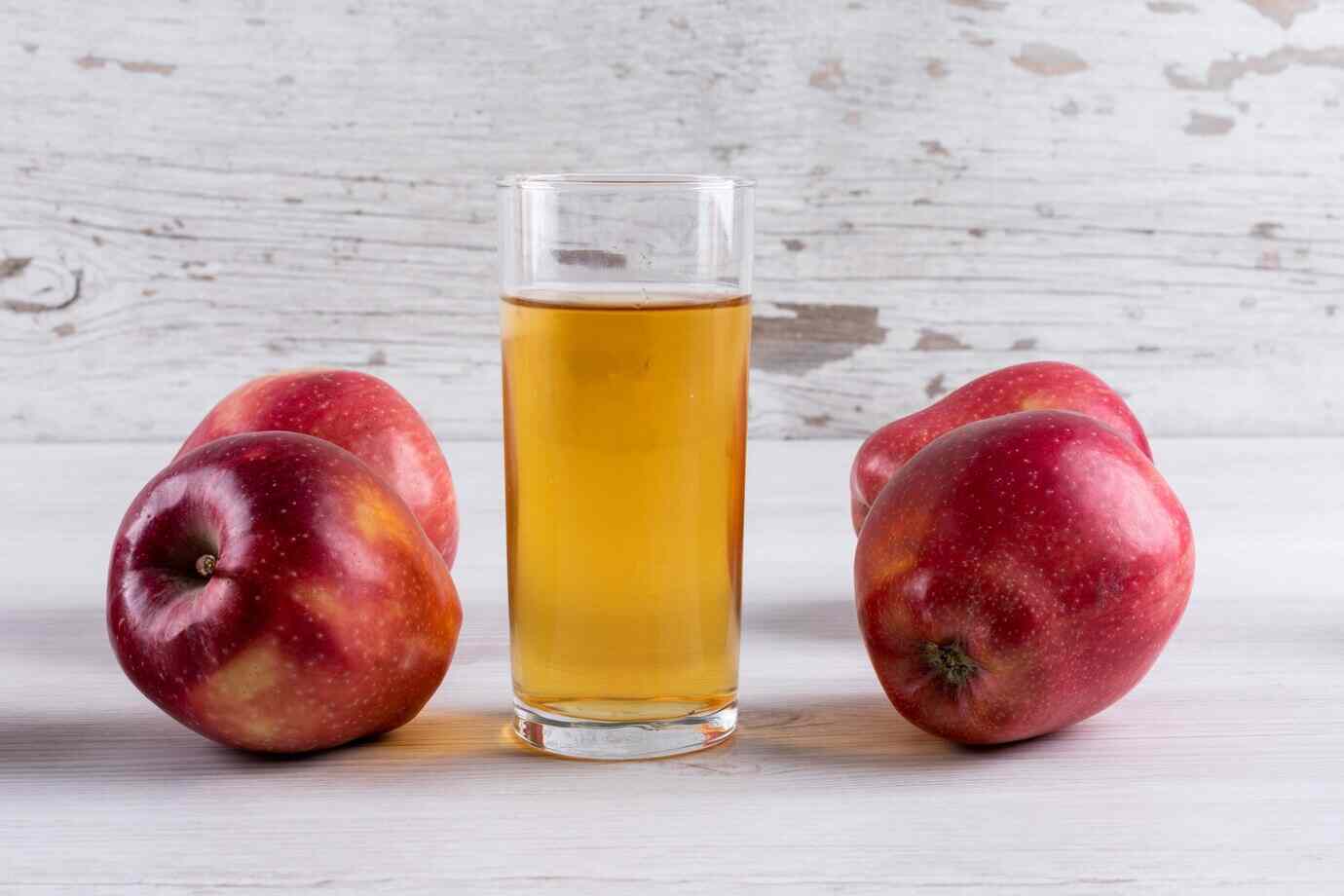Apple juice has long been a staple in homes, lunchboxes, and breakfast tables. It’s sweet, easy to drink, and often labeled as a natural, healthy choice. But have you ever stopped to ask, is apple juice good for you?
While it’s true that apple juice comes from fruit, the story doesn’t end there. Many store-bought versions are heavily processed, filtered, and packed with sugar—sometimes just as much as soda. On the other hand, it does contain beneficial compounds like vitamin C and plant antioxidants.
So where does apple juice fall on the health scale? Is it a smart way to hydrate, or more of a sugary indulgence? This article breaks down the apple juice health debate, looking at its nutritional profile, how it’s made, and the potential pros and cons of drinking it.
If you’re curious about whether that glass of apple juice is helping or hurting your health goals, read on. We’re digging into the facts—no added sugar needed.
Apple Juice Nutrition Facts
Apple juice may seem simple, but its nutritional content varies depending on how it’s processed. Whether it’s fresh-pressed, from concentrate, or unfiltered, each type offers a slightly different profile.
Here’s a quick look at the typical nutrients in 1 cup (8 oz) of unsweetened apple juice:
| Nutrient | Amount (per 8 oz) | Key Benefit |
| Calories | 110 | Provides quick energy |
| Total Sugars | 24–28g (mostly fructose) | Natural sugar, but spikes blood sugar |
| Vitamin C | 60–100% DV (if fortified) | Supports immune health |
| Potassium | ~250mg | Helps with hydration and muscle function |
| Phytonutrients (like quercetin) | Small amounts | Antioxidant, anti-inflammatory support |
Now, compare that to a whole medium apple:
- Calories: ~95
- Sugars: ~19g
- Fiber: 4g (none in juice)
- Vitamin C: ~8% DV
- More antioxidants in skin
Whole apples offer more fiber and slow the absorption of sugars—keeping energy steady. Most commercial apple juices are filtered, removing fiber and reducing phytonutrient levels. Unfiltered or cloudy juices retain more antioxidants, but still lack fiber.
So, while apple juice contains useful vitamins and phytonutrients, it’s best consumed in moderation and shouldn’t replace whole fruit.
Health Benefits of Apple Juice
Apple juice may not be a superfood, but it does offer some real health perks—especially when consumed in moderation. From hydration to antioxidant protection, here’s how this popular drink can support your body:
1. Hydration Support
Apple juice is mostly water, making it a helpful way to stay hydrated. It’s often used to rehydrate children during mild illness or after vomiting. A study published in JAMA even found diluted apple juice to be as effective as electrolyte drinks for mild dehydration in kids.
Bonus tip: It’s easy on the stomach, making it a go-to fluid when water feels hard to tolerate.
2. Antioxidant Power
Apple juice contains polyphenols and flavonoids, like quercetin and chlorogenic acid. These plant compounds help fight oxidative stress, which contributes to aging and chronic diseases. Unfiltered or cloudy apple juice has more of these antioxidants than clear versions.
According to a study in Nutrition Journal, apple polyphenols may support heart health and protect cells from inflammation.
3. Digestive Relief
While it lacks fiber, apple juice can still help mild constipation, especially in children. It contains sorbitol, a natural sugar alcohol that pulls water into the colon and eases bowel movements. It’s often recommended as a gentle option for digestive support during mild illness or recovery.
4. Immune Boost (When Fortified)
Some apple juices are fortified with vitamin C, offering up to 100% of the daily value per cup. Vitamin C is essential for immune function and wound healing. This makes fortified apple juice a convenient source—especially for picky eaters or kids.
While these apple juice health benefits are real, they’re best enjoyed in moderation. Look for 100% juice with no added sugar, and opt for cloudy or fresh-pressed varieties when possible for maximum nutrients.

Potential Downsides of Apple Juice
While apple juice has some benefits, it also comes with important limitations—especially when consumed in excess. Here’s what to consider before making it a daily habit.
1. High Sugar Content
One cup of 100% apple juice contains about 24–28 grams of natural sugar—almost as much as a can of soda. Even though it’s naturally derived, this sugar can still cause blood sugar spikes, especially if you drink juice without protein, fat, or fiber to slow absorption.
Over time, high sugar intake may contribute to insulin resistance, a risk factor for type 2 diabetes.
SEO Tip: If you’re concerned about apple juice sugar content, dilute it with water or limit portions to 4–6 ounces.
2. Lack of Fiber
Whole apples offer about 4 grams of fiber, which helps slow digestion, manage blood sugar, and support gut health. Apple juice, by contrast, contains little to no fiber—especially the clear varieties.
This makes juice less filling and easier to overconsume, which can lead to overeating and weight gain over time.
3. Overconsumption Risks
Regularly drinking large amounts of juice—natural or not—has been linked to:
- Tooth decay (due to sugar bathing the teeth)
- Unwanted weight gain
- Poor blood sugar control
According to research from Harvard School of Public Health, swapping whole fruit for fruit juice is associated with a higher risk of developing type 2 diabetes.
4. Juice and Kids: What Experts Say
The American Academy of Pediatrics recommends:
- No juice before age 1
- 4 oz/day for kids ages 1–3
- 4–6 oz/day for kids 4–6
- 8 oz max/day for kids 7 and older
Why? Too much juice can lead to cavities, tummy troubles, and nutrient displacement—meaning it may take the place of more balanced foods or whole fruits.
So, is apple juice healthy for kids or adults? In small amounts, yes—but it’s best viewed as an occasional treat rather than a daily drink. Choosing whole apples instead is usually the better option for long-term health.
Best Practices for Drinking Apple Juice
Apple juice can be part of a healthy diet—but it’s all about how you drink it. Here are a few smart tips to enjoy the benefits without overloading on sugar.
1. Choose 100% Juice, No Added Sugar
Always read the label. Go for 100% apple juice with no added sugars or syrups. Some brands sneak in sweeteners that spike your blood sugar even faster.
2. Pick Cloudy or Unfiltered Juice
Cloudy juice may not look as pretty, but it usually contains more polyphenols—the antioxidants linked to cell protection and reduced inflammation. These compounds tend to get filtered out of clear juice.
3. Keep Portions Small
Stick to 4 to 6 ounces per day, especially for kids or anyone watching sugar intake. That’s about half a standard cup—just enough to hydrate and enjoy, without going overboard.
4. Drink It With Food
Wondering about the best time to drink apple juice? Have it with a meal, not on an empty stomach. Food helps slow the absorption of sugar, reducing the chance of blood sugar spikes.
5. Watch for Juice Blends
Some “apple juice” drinks are actually blends with added flavors, concentrates, or dyes. When in doubt, go simple and pure.
How to drink apple juice wisely? Focus on quality, timing, and portion size—and you can enjoy the taste without the downsides.
FAQs: Apple Juice and Your Health
Is Apple Juice Good for Digestion?
Yes, apple juice can support digestion, especially in cases of mild constipation or during illness recovery. It contains sorbitol, a natural sugar alcohol that helps soften stool, and its water content aids hydration. Still, whole apples offer more benefits thanks to their fiber.
Can Diabetics Drink Apple Juice?
It depends. Apple juice for diabetics can cause blood sugar spikes due to its high natural sugar and low fiber. If you have diabetes, keep servings small (about 4 oz), and drink it with a meal to slow glucose absorption. Always consult your healthcare provider before adding it to your diet.
Does Apple Juice Help You Sleep?
It might help slightly. Apple juice contains vitamin C and potassium, and some claim it raises serotonin levels, which may promote relaxation. However, it’s not a proven sleep aid. Drinking it before bed could disrupt sleep due to sugar content and nighttime bathroom trips.
What’s the Difference Between Filtered and Unfiltered Apple Juice?
Filtered apple juice is clear, with most pulp and antioxidants removed. In contrast, unfiltered (cloudy) juice retains more polyphenols and fiber-like compounds, making it the more nutrient-rich option. For better health benefits, choose unfiltered when possible.
Conclusion: Is Apple Juice Good for You?
Apple juice can be part of a healthy diet—if enjoyed in moderation. It offers hydration, antioxidants, and a sweet flavor many people love. But it also comes with drawbacks like high natural sugar and lack of fiber.
For better nutrition, whole apples are the smarter choice. They’re more filling, support digestion, and don’t spike your blood sugar as quickly.
If you enjoy apple juice, choose 100% juice with no added sugar and keep servings small—4 to 6 ounces per day. Opt for cloudy, unfiltered versions for more polyphenols. As with all things, balance is key.
